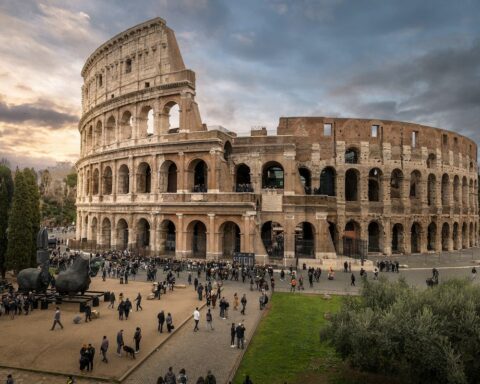Mario Draghi, the former European Central Bank chief, has accepted a mandate to try to form a new Italian government as the country seeks a way out of the political crisis triggered by the collapse of its most recent coalition.
Draghi, nicknamed “Super Mario” for his role in saving the European single currency, will have to galvanise support in parliament to quickly build a technical administration needed to manage the coronavirus pandemic and revive its battered economy.
Draghi was summoned on Wednesday to meet Italy’s president, Sergio Mattarella, after ruling coalition partners failed to form a majority following Giuseppe Conte’s resignation as prime minister last week.
“I thank the president of the republic for the trust he has placed in me,” Draghi said in a brief speech after the meeting. “Overcoming the pandemic, completing the vaccination campaign, responding to the needs of citizens and relaunching the country are our challenges. We have extraordinary resources coming from the EU and we can do a lot for the future of the country.”
Italy is poised to receive over €200bn from the EU’s recovery fund – the largest share among member states.
Milan’s stock exchange made gains in early trading on Wednesday after news of the meeting between Mattarella and Draghi was confirmed the previous evening. Mattarella ruled out calling early elections, adding that a “high profile” technical government was needed to steer the country.
The crisis was triggered when the former prime minister Matteo Renzi withdrew his small Italia Viva party from the ruling majority in January due to clashes over the government’s handling of the pandemic and the spending plan for the recovery fund money. Renzi, whose party did not support the formation of a new majority under Conte, has repeatedly suggested Draghi as the ideal person to lead a new government.
“Now is the time for sobriety,” he wrote on Facebook. “No more polemics. Long live Italy.”
Draghi said on Wednesday he was confident “unity will emerge” from dialogue with political parties and parliamentary groups. However, it is unclear whether he will win the broad support needed from political forces.
The Five Star Movement (M5S), the biggest party in parliament, said it would not back a technical administration led by Draghi, arguing that a political government was the only solution. The populist party emerged as a powerful force in part as a reaction to Italy’s last technocratic government.
Nicola Zingaretti, the leader of the centre-left Democratic party, said he would meet leaders of M5S and Free and Equal, a small leftwing group in the alliance. “Draghi’s appointment opens up a new phase that could lead the country out of the uncertainty created by an irresponsible and absurd crisis,” he said.
Matteo Salvini, the leader of the opposition far-right League, and Giorgia Meloni, who heads the smaller far-right Brothers of Italy, both repeated calls for early elections. Speaking for both parties and the conservative Forza Italia, who are in alliance, Salvini said the three would however have no prejudices in their meetings with Draghi and would present policy proposals before deciding what to do in parliament.
“We want to see a serious plan for cuts in taxes and bureaucracy, plans for schools, works projects to open – and obviously a prospective to a vote,” he tweeted.
The Forza Italia leader and former prime minister Silvio Berlusconi separately appeared to back the plan, recalling his “longstanding esteem” for Draghi.
The last time a technocrat was appointed in Italy was in 2011, when Mario Monti was entrusted with leading the country out of an acute debt crisis that prompted Berlusconi’s resignation.
La Stampa columnist Massimo Giannini wrote on Wednesday that Draghi’s appointment was Italy’s “only hope”. “We can only hope that it works,” he added. “As it’s the last hope we have to guarantee a better future for our children. We do not even want to imagine that the parties, after the embarrassment so far, can still escape their responsibility.”





